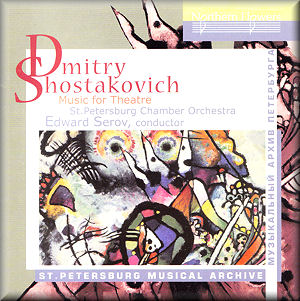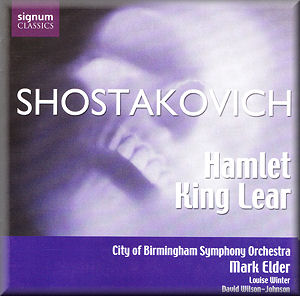 |
 |
| 
Buy
through MusicWeb
for £13.50 postage paid World-wide.
Musicweb
Purchase button
|
Dmitri SHOSTAKOVICH
(1906-1975)
Music for the theatre – Hamlet, The
Human Comedy and King Lear
Full track listing at end of review
 *Nina
Romanova (mezzo) *Nina
Romanova (mezzo)
St. Petersburg Chamber Orchestra/Edward Serov
rec. 1984, Capella Concert Hall, St. Petersburg, Russia
 NORTHERN
FLOWERS NF/PMA 9905 [46:35] NORTHERN
FLOWERS NF/PMA 9905 [46:35]  |
| 

alternatively
CD: MDT
AmazonUK
AmazonUS
Sound
Samples & Downloads |
Dmitri SHOSTAKOVICH
(1906-1975)
Hamlet and King Lear – Complete
incidental music
Full track listing at end of review
 Louise Winter (mezzo)
Louise Winter (mezzo)
David Wilson-Johnson (baritone)
Igor Khokhlovin (player-king)
Luba Stuchevskaya (player-queen)
City of Birmingham Symphony Orchestra/Mark Elder
rec. 13-15 June 1994, Symphony Hall, Birmingham, UK
 SIGNUM CLASSICS SIGCD052 [73:03]
SIGNUM CLASSICS SIGCD052 [73:03]  |
| |
|
| |
These two recordings – made a decade apart – couldn’t be more
different. The Northern Flowers issue offers only some of the
incidental music Shostakovich penned for these plays, whereas
Signum’s disc is a much more comprehensive – and scholarly –
attempt to present all the music written for Hamlet
and King Lear. Indeed, as the back-cover blurb reminds
us, these are world premieres achieved, in part, through the
sterling efforts of Shostakovich expert Gerard McBurney, who
has also given us a performing version of the composer’s music-hall
show Hypothetically Murdered (Signum SIGCD051). The Serov/St.
Petersburg collection also includes excerpts from the music
for Pavel Sukhotin’s play The Human Comedy, adapted from
Balzac’s Le Comédie humaine; again, this is restricted
to just a few numbers.
Shostakovich’s 1932 score for Nikolai Akimov’s controversial
production of Hamlet precedes the composer’s fall from
grace, signalled by the devastating criticism of his opera Lady
Macbeth of the Mtsensk District and, to a lesser extent,
his ballet The Limpid Stream. The scores for Grigori
Kozintsev’s productions of Hamlet and King Lear
come later, and despite some fine music – notably in the Fool’s
ten songs – the abrasive energy and wit of the 1932 Hamlet
has been lost. That said, this music is never less than accomplished,
and these contrasting – and complementary – discs make that
abundantly clear.
The Soviet-era Northern Flowers recording is typical of Melodiya
issues of the period – rough, but invested with an idiomatic
tang that’s hard to resist in this music. Serov gets Hamlet
off to a sizzling start, the narrow soundstage opening out nicely
as the music progresses. Those ripe Russian woodwinds are well
played and recorded, and the hard drum thwacks at the start
of ‘A flourish and dance music’ certainly made me jump. I must
say this brazen sound and edge-of-the-seat playing really appeals
to me here; it’s a quality I miss in Riccardo Chailly’s much-too-civilised
DSCH recordings for Decca and, to some extent, in Elder’s immaculate
presentation of these theatrical scores.
The plucked basses, flutes and eye-watering trumpets of this
Russian band – allied to deftly sprung rhythms – are an absolute
joy to hear, ‘The hunt’ presented with all the pizzazz of a
Hollywood Western. Vulgar? Oh yes, but who cares when it’s played
with such unbridled energy and flair. As for ‘The actors’ pantomime’
and ‘Ophelia’s ditty’, they trip along most attractively, crowned
by impressive contributions from the overworked percussion section.
But it’s not all a mad mêlée, and Shostakovich gives
us gentle ‘Lullaby’ to prove the point. As for the doleful Dies
irae in ‘Requiem’, it’s most effective, the music building to
a ferocious climax. Add to that the insouciance and swagger
of ‘Fortinbras’s march’ and you have a most entertaining little
suite.
Mark Elder’s recording contains all the incidental music from
Akimov’s Hamlet, plus two items Kozintsev requested for
his 1954 production of the play. There’s much to explore here
– 32 tracks, some lasting a mere 10 to 20 seconds – all superbly
recorded in the superior acoustic of Birmingham’s Symphony Hall.
And, as expected, the CBSO – well-trained under Sir Simon Rattle
– play very well indeed. Straight A/B comparisons with the Serov
excerpts are very instructive. Elder’s ‘Introduction and night
watch’ may be less febrile, but it’s beautifully detailed and
rhythmically refined; the downside is that dramatic contrasts
aren’t as strong, the presentation rather more po-faced than
Akimov’s strange production might suggest.
That said, Elder and the CBSO give a thoroughly engaging account
of these orchestral snippets; and what they might lack in adrenalin
they more than make up for in the nuances and subtleties they
find in this multi-faceted score. Indeed, if Serov gives the
impression this is just a daisy-chain of overheated, rumbustious
tunes then Elder’s reading reminds us that even here Shostakovich
is as original and compelling as he is in other genres. As for
the Russian dialogue – between Rosenkrantz and Guildenstern,
for instance – it’s an acquired taste, but at least it’s kept
to a bare minimum.
At around five hours Akimov’s original production was far too
long and had to be shortened. Some of the music was cut as well,
but with the help of a piano reduction McBurney has restored
the Act V out-takes. I’m less sure about the sung parts – David
Wilson-Johnson in ‘Requiem’, for instance – but it’s hardly
a big issue. A sprightly ‘Fortinbras’s march’, plus the ‘Gigue’
and ‘Finale’ from the 1954 production, round off this part of
the disc. Indeed, it’s a measure of the thoughtful, scholarly
way this project has been realised that it all dovetails so
well; a very impressive achievement all round.
Regrettably, Shostakovich’s music for The Human Comedy
has only survived as the Ballet Suite No. 3 (1952). That
said, there’s enough left to show the composer at his engaging
best; just sample those lovely, cinematic pans across Paris
and the Seine (trs. 9 and 12). The acerbic Shostakovich isn’t
far away, though – ‘The police station’, the delicious ‘Gavotte’
and ‘March’ played with plenty of wit and point. It never ceases
to amaze me how Shostakovich can make a simple march sound like
a giddy dance, as he does here. Those interested in hearing
more excerpts from this score should seek out Neeme Järvi’s
fine 2-CD set of Shostakovich’s ballet music (Chandos CHAN 10088).
It’s a terrific collection, and one that all DSCH devotees should
have on their shelves.
Serov and his orchestra are as bracing as ever in the seven
excerpts from King Lear. The ‘Return from the hunt’ features
some wonderfully Russianate horns; Elder’s version is altogether
more reticent – elegant, even – but then that’s his way with
this music. What really distinguishes his recording is the ‘Fool’s
ten songs’, sung here by David Wilson-Johnson. They’re a motley
collection, yet they form a convincing – and highly concentrated
– little song-cycle. The light, chamber-like scoring is very
well captured too; as for Wilson-Johnson, he’s a little hammy,
but not too much so. Elder is a sensitive accompanist throughout.
The Northern Flowers recording is generally bright without being
fatiguing, although the brass and searing strings do become
a little too acid in the excitable music of ‘In Regan’s castle’.
That said, ‘The military encampment’ is rather more restrained,
the hugely theatrical drumming of ‘March’ and the rat-a-tat
of snare drums in ‘Trumpets’ simply thrilling. But it’s the
start to ‘Cordelia’s ballad’ that will really make your hair
stand on end. Mezzo Nina Romanova reminds me of the soulful
Elena Obraztsova in Claudio Abbado’s classic DG recording of
Alexander Nevsky. Hers is a typically warm, Russianate
voice, and quite steady too. Louise Winter, for Elder, is much
cooler and more distant, but no less affecting for that; again,
Shostakovich’s chamber-like scoring is well captured by the
Signum team.
Two very different approaches to this music, both compelling
in their own way. Serov will please those who like their vodka
neat and from the bottle, whereas Elder will appeal to moderate
and discerning tipplers. The latter’s performances are also
important musical documents, but that doesn’t mean they are
as dry as dust – far from it. Factor in spoken and sung texts
– with translations – and highly detailed liner-notes by McBurney
and the Signum disc becomes self-recommending. The Cyrillic
text in the Northern Flowers issue – complete with stilted English
translations and bizarre typos – won’t win any prizes for presentation,
but it should win friends for this marvellous music.
Mandatory listening for all Shostakovich fans.
Dan Morgan
Track listing – Northern Flowers/Serov
Hamlet, Op. 32a – excerpts (1932)
Introduction and night watch [2:35]
A flourish and dance music [2:10]
The hunt [1:42]
Actors’ pantomime [1:39]
Ophelia’s ditty [1:43]
Lullaby [1:23]
Requiem [1:46]
Fortinbras’s march [2:10]
The Human Comedy, Op. 37a – excerpts (1934)
View of Paris [2:25]
Police officer [1:20]
Gavotte [2:15]
Banks of the Seine [3:45]
March [2:05]
King Lear, Op. 58a – excerpts (1941)
Return from the hunt [0:48]
The scene on the heath [2:00]
In Regan’s castle [1:13]
The military encampment [1:20]
March [1:32]
Trumpets [1:17]
Cordelia’s ballad* [4:35]
Track listing – Signum/Elder
Hamlet, Op. 32 (1932) (complete incidental music from
the 1932 premiere)
Act I [9:27]
Act II [5:13]
Act III [10:03]
Act IV [10:43]
Act V [9:30]
Hamlet (incidental music from the 1954 production) [3:08]
Gigue [1:37]
Finale [1:29]
King Lear, Op. 58a (1941) (complete incidental music
from the 1941 production) [24:58]
Prelude and Cordelia’s ballad [4:44]
The return from the hunt [0:49]
The Fool’s ten songs
1. He who decides ... [0:25]
2. Fools had ne’er less grace in a year [0:56]
3. He that keeps nor crust nor crumb [0:15]
4. The hedge-sparrow fed the cuckoo so long [0:44]
5. Fathers that wear rags ... [0:38]
6. When priests are more in word than matter [0:56]
7. A fox when one has caught her [0:57]
8. The cod piece that will house ... [0:49]
9. He that has and a tiny little wit [0:47]
10. That sir which serves and seeks for gain [2:03]
Finale of Act I [1:25]
The approach of the storm [1:29]
The scene on the heath [2:03]
The blinding of Gloucester [0:59]
The military encampment [1:37]
Fanfares [1:08]
March [2:09]
|
|












